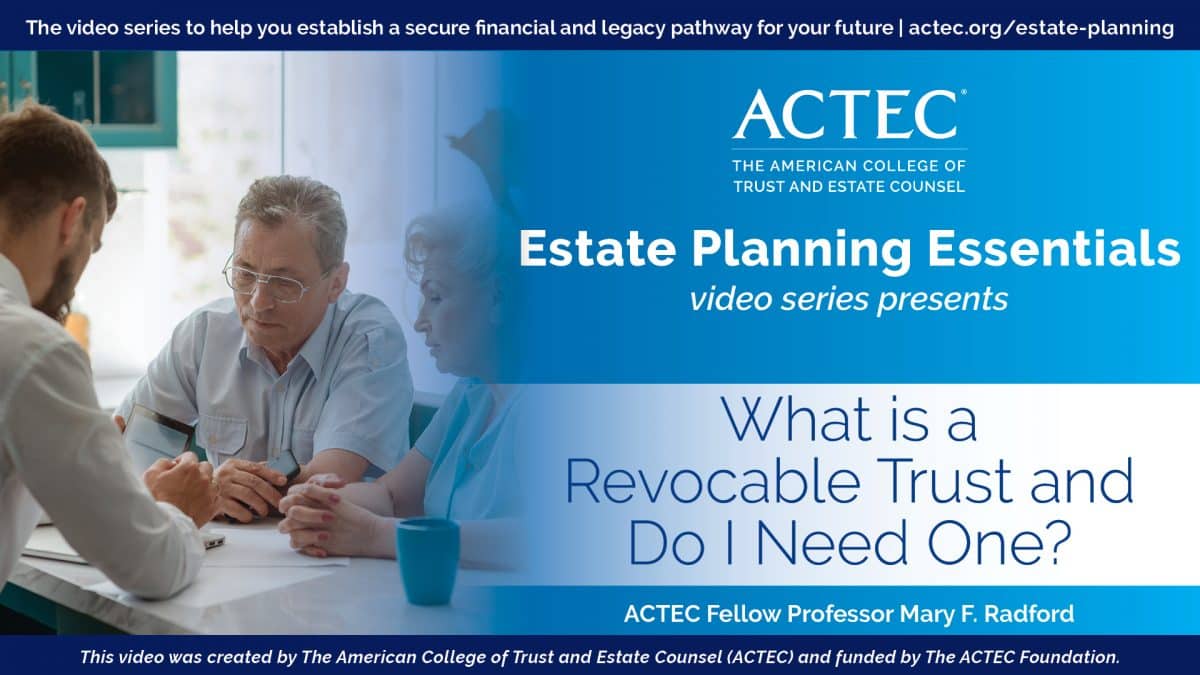A revocable trust can help avoid probate for assets that have been properly transferred into the trust during the grantor’s lifetime. This can streamline the distribution of assets and maintain privacy.
ACTEC Fellows Jonathan W. Michael and Stacy E. Singer explain the purpose and role of a revocable trust in avoiding probate, what a revocable trust can and cannot do, if a revocable trust can protect assets from creditors, and steps individuals need to take when setting up a revocable trust.
Transcript
Hi, my name is Stacy Singer. I’m an ACTEC Fellow, and I’m here with Jonathan Michael, an ACTEC Fellow from Chicago. Welcome Jonathan.
Jonathan Michael: Thank you.
Stacy Singer: And we’re here to talk about what is a revocable trust and what is a trust. So let’s start with the first question. Jonathan, what is a trust?
Jonathan Michael: Well, a trust is a way to own property in which title to the property is actually retained by the trustee of the trust, and a beneficiary will be the person or persons for whom the trust is created.
Jonathan Michael: Generally speaking, an individual will create a trust, and oftentimes they’ll designate themselves as the initial trustee and designate other individuals or institutions as successor trustees who will act in the event that the grantor is disabled or dies.
Stacy Singer: Okay, so what then is a revocable trust?
Jonathan Michael: A revocable trust is a trust created by the grantor again. Typically, this is also the case in which the grantor will designate themselves as the initial trustee, and the grantor will also designate individuals or institutions as successor trustees to act, again, in the event of the grantor’s disability or death. One thing to keep in mind about a revocable trust is that, by its very definition, it is revocable. So therefore, throughout the grantor’s lifetime, they always have the ability to revoke the trust, to amend the trust, or to terminate the trust, and to take back the property that they contributed to the trust if they so desire.
Stacy Singer: Okay, so what does a revocable trust do and not do?
Jonathan Michael: The primary advantage of a revocable trust is to avoid probate. Probate is a proceeding that occurs typically when an individual passes away. The probate process is something that can be long and costly, and so by having a revocable trust, you can avoid the probate process in its entirety.
Stacy Singer: And can you explain a little bit about what happens if the grantor were to become disabled and had a trust?
Jonathan Michael: Sure. Another advantage to having a revocable trust is during the lifetime of the grantor if they become disabled, then the trustee, the successor trustee, would come in and manage those assets on behalf of the grantor. If it were the case that no trust was in place, then under that same circumstance in which an individual becomes incapacitated, there would be a separate court proceeding in which a guardian would be appointed by the court, and that person would be in charge of managing the assets on behalf of the disabled individual. The downside to that approach is that there are court costs, there are fees, and, quite frankly, the whole situation is not private. One thing to keep in mind is that a will is a public document; a trust is a private document. In the same vein, if there was a disabled individual, all decisions that are being made relative to that person, and that person’s assets, are in front of the court and under the supervision of the judge.
Stacy Singer: So, are the assets in a revocable trust safe from creditors?
Jonathan Michael: No, this is a common misconception. It is the case that assets that are owned in a revocable trust are subject to the grantor’s creditors in the same way as if they owned them themselves. So therefore, there are no creditor protections available by just having a revocable trust and transferring assets into the revocable trust during the grantor’s lifetime.
Stacy Singer: So, what steps would someone need to take with their revocable trust?
Jonathan Michael: Well, the first step to take after executing the revocable trust would be to fund the living trust. This means transferring title of the assets that you have in your individual name into your name as trustee of the revocable trust. Now some people will see this as a disadvantage because there’s some work to be done. But nevertheless, for the advantages that we outlined previously, such as we avoid probate in the event of death and we also avoid guardianship in the event of a disability, one would see that the utilization of the revocable trust would actually be a benefit. So, in terms of transferring title to assets, it’s a pretty straightforward process. For example, if you have a piece of real estate that’s owned in your individual name, you would execute a new deed transferring title into the name of your revocable trust. The same could be said for checking accounts, brokerage accounts, or other types of assets.
Stacy Singer: Got it. Well, thank you, Jonathan, that was incredibly helpful. I do want to mention to all of you that if you’d like more information about revocable trusts, check the ACTEC website, where there’s a longer discussion of it with Professor Mary Radford. Thanks so much for joining us.
Featured Video
What is a Revocable Trust and Do I Need One?
A revocable trust is a flexible estate planning tool that avoids probate. Learn why you may need it for privacy, asset management, and to avoid probate.
ACTEC Estate Planning Essentials

ACTEC Fellows provide answers to frequently asked trust and estate planning questions in this video series.



